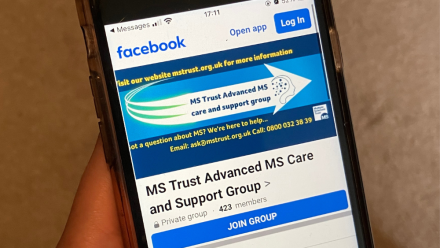Respite care
Respite care is short-term, temporary support that allows people with multiple sclerosis (MS), and the family members or carers who look after them, to have a break and a little time to themselves.
Information, tips and community support for partners, family and friends with caring responsibilities. Whether you see yourself as a ‘carer’ or not, you will find information and support here to help make life a little easier for you and your loved one with MS.
Supporting someone with care needs can be challenging even for the closest relationships, but it can also be the catalyst for a deeper and more fulfilling connection. People may find it strengthens their bond as they support one another through the highs and lows. Some may embrace friendships and new partnerships fully aware of the immediate challenges, while others will find this harder, because it’s not easy. Powerful emotions like fear, anxiety and resentment can affect relationship dynamics. Not everyone sees themselves as a ‘carer’ or wants to be ‘cared for’. There may be a period of adjustment as you both try to find a way through.
For any new couple beginning this journey, communication is everything. Talk lots and listen equally. Be there for each other but also give yourself what you need. Don't think too far ahead, no-one knows what's around the corner so what's the point in worrying? And last but not least, laugh. Some days you just have to find the funny.
Sharon
Support is available, but it’s not always obvious, so it helps to know where to look. This can take time and energy on top of all the other pressures. You do have rights though, and these can make a difference as you juggle caring responsibilities around busy lives.
Below, we share some pointers to get you started.
We often hear from people with caring responsibilities that they are partner, family or friend first. Some really dislike the word 'carer' and they are not alone in feeling uncomfortable. NHS England says it takes people on average two years to acknowledge they are a carer.
So we use the term loosely here, but still refer to it because it gives you rights and we want you to benefit from the support available.
According to Carers UK a carer can be “a person of any age who provides unpaid care and support to a family member, friend or neighbour who is disabled, has an illness or long-term condition, or who needs extra help as they grow older.”
This may include:
You can find information on carer rights on Mobilise, Carers UK and Carers Trust. Some are set out in the care laws for each UK nation, while other protections are covered by employment and equality legislation.
If you’re supporting someone with MS with regular, unpaid care, you are entitled to a carer's assessment or an adult carer support plan as it's known in Scotland. This is not a test of your abilities as a carer, nor is it about the person you support, because they can have a separate care needs assessment.
The carer’s assessment is all about you and about how your needs can be supported. Yet its uptake is thought to be low, with Carers UK's State of Caring 2022 reporting only one in four carers surveyed had had one in England.
You should have an assessment at least once a year because needs change. While you await the outcome, Mobilise's mini carer’s assessment can help direct you to local support in the meantime.
There are different assessments for adult and young carers, plus a transition assessment before carers turn 18. Requesting one depends on where you live or the person you care for lives:
It is worth going into the assessment prepared so you can get all your points across. These website's may help:
It is usually carried out face-to-face, sometimes over the phone or online. If you can, choose somewhere private where you can talk openly and honestly.
If the council or health trust decide that you qualify for help, they will produce a care plan for you. This outlines what support you need, how it will be given, and what costs they will cover. It may include help with equipment to make caring easier or temporary carers while you have a short break for example. According to Carers UK, it helps to have an emergency plan included in your care plan.
If you don’t qualify at this time, you should be told the reasons why in writing. It doesn’t mean you won’t be eligible in the future. Your council or health trust should point you towards local support, so if this doesn’t happen, do ask them as it can be helpful.
If you disagree with the outcome of your carer's assessment, and want to make a formal complaint, contact the council or health trust. If you are still unhappy with the response, the next step is to contact their independent ombudsman.
It is worth setting aside time to plan for emergencies, so your loved one continues to get the care and support they need. These may include a sudden illness, family emergency, an accident, being admitted to hospital or being delayed getting home for example.
Emergencies are stressful times, but being prepared can reduce some of the pressure. Note that if you have a care plan, it should include this too.
These links give some suggestions for what you may like to include:
All GPs should have a carers register which you can ask to join. It can offer you more flexibility with appointments, repeat prescriptions as well as access to free annual health checks and flu vaccinations. You may also find it a useful way to connect to local support groups and services.
It’s important to know when to focus on your needs. Caring responsibilities can be all-consuming, so setting aside some ‘me’ time will benefit you both. This can help to manage expectations and stave off frustration and resentment.
Taking on a caring role can affect the dynamics of some relationships, so it’s important to discuss whether it’s something you both want. Often it involves intimate care, such as washing, dressing and toileting. It can also be physically demanding too, if you are doing a lot of lifting or helping with bed or wheelchair transfers. Getting professional carers in can take some of the pressure off you both.
These resources may help:
To find out what support is available in your area try Carer’s UK’s online directory where you can find information on local services. They usually include local respite care providers, sitting services while you take a break, carer’s groups and carer’s emergency card schemes. Carers Trust also has a searchable network of partners offering support and replacement care services near you.
Looking after your needs is an essential part of supporting a loved one with MS. But we also know it is easier said than done when you're facing daily challenges and raw emotion. Ignoring your physical and mental health needs will take its toll, with burnout involving a lengthy recovery process.
Exercise and staying active, eating well and sleep are key. Scheduling in a regular slot for a hobby can invigorate you. Carers UK's Active carers hub has lots of practical tips and advice to boost your health and get you moving with online exercise classes.
According to Carers UK's State of Caring Survey 2023, three in four carers felt stressed or anxious, while half felt depressed. This is not something that should be left to fester, so if you can relate to this, speak to your GP about getting a referral for psychological support. Jen, a long-term carer, did just that after finding herself spiralling:
My local NHS was extremely helpful, and I accessed counselling via Encompass within the space of a couple of weeks because they gave me an emergency referral. You do have to find it, but there is help out there and it's about speaking up and saying that you're struggling. Even going on some kind of medication to help settle the mind and help you deal with things a bit better, something as simple as that can help.
Jen
Support from others in similar situations is particularly helpful as they understand without you having to explain:
Carers Connect: you can join Carers UK’s online forum for unpaid carers
Mobilise's virtual cuppa: 45-minute video calls with others with caring responsibilities.
There’s only so much you can talk about with people outside of the situation. Other carers get it - you can even joke about things that seem too dark to discuss elsewhere. A good sense of humour is essential when you're a carer.
Jen
Making sure you get a break is important to help you recharge. You are not letting anyone down. Instead you're giving yourself a well-timed breather, so you have the energy, and the mental and emotional stamina to care for your loved one. You will feel stronger for it.
Taking a break from caring responsibilities may mean an hour of quiet downtime, or a couple of hours off every Friday or maybe a day-off. Other times you'll need a complete break away, so professional carers provide support at home or in a care home, or family and friends cover while you're away.
We know that many people with caring responsibilities also work. We also know that complex care needs can make it very difficult to continue working. Before you make any decisions, it's worth checking your contract and company policies to see if they go beyond statutory rights.
The information below may help too:
UK employees have a legal right to request flexible working. You can find more information on ACAS (England, Scotland and Wales) or the Labour Relations Agency (Northern Ireland).
You are entitled to take a reasonable amount of time off to deal with an emergency involving a dependant, and this includes someone who depends on you for care. According to GOV.UK, there are no limits to the number of requests, though they do acknowledge that "your employer may want to talk to you if they think time off is affecting your work." However for Northern Ireland, NIdirect states: "You are entitled to take a reasonable amount of time off if you have worked for your employer for at least a year and there is an emergency with the person you care for."
It is worth checking the finer details:
Employees with caring responsibilities in England, Scotland and Wales are also entitled to five days unpaid carer’s leave a year. You can take this as separate half days, full days or a five-day block. ACAS website has some useful information about carer’s leave. It currently does not apply to Northern Ireland.
We know that for many, caring responsibilities can make it more difficult to stay in work, adding pressure to your finances. It is therefore worth checking if you qualify for one or more state benefits. You can get a quick idea with a benefits calculator. Alternatively, speak to an independent benefits adviser to get tailored advice for your situation.
Below we only refer to Carer's Allowance/Carers Support Payment, Carers Credit and grants, but there are many more benefits you may be entitled to.
You may be able to claim Carer’s Allowance (England, Northern Ireland, Wales) or Carer Support Payment (Scotland) if you are:
To find out whether you qualify and how to apply, click on the link for your area:
We recommend that you speak to an independent benefits adviser about your personal circumstances and other benefits you claim.
If your application is successful, it is really important that you do not exceed the weekly earnings threshold as this avoids costly repayments. There has been a lot of media coverage on this topic, and an independent review will report back in summer 2025. Campaigners are hopeful improvements will be put in place.
If you are caring for someone for at least 20 hours a week, this helps plug gaps in your National Insurance record. This is important for your State Pension. Note you can’t have Carer’s Credit if you receive Carer’s Allowance.
There are a wide variety of grants available if you know where to look. Here's some suggestions:

We understand MS, the challenges, and how it affects partners, family members and friends. It's free, confidential and open weekdays 10:00-16:00 (except bank holidays). Do get in touch on 0800 032 38 39 or ask@mstrust.org.uk.

Our private Facebook group for people with Advanced MS and those who care for them. Living with Advanced MS puts unique strains on family life. It can be easier to talk about with those facing similar experiences.

An open group for anyone affected by MS, which means members as well as non-members can see the conversations. You can post comments, reflections and questions about life with MS, and do so anonymously if you prefer.
Some in our community understand the challenges you face. Below is a selection of their experiences, which may resonate:
The National Institute for Health and Care Excellence (NICE) published a new guideline to support adult carers. The guideline aims to improve the lives of carers by helping health and social care practitioners identify people who are caring for someone and give them the right information and support. It covers carer's assessments, practical, emotional and social support and training.
More on the NICE guideline on supporting adult carers
Young people caring for a family member with a disability or health condition can find their lives, education and mental health impacted. A number of children's charities focus on young carers and can offer respite, support and activities for children who take on caring duties in their families: